Family
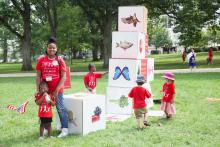
Help them understand they have a voice.
Elizabeth Brandt, a mom and a participant of the play-in, takes her young daughters to her senators’ office. She believes she believes this will lay a foundation for her daughter to speak up throughout her life.
“She may not have the most articulate things to say — last year when she was three she asked them not to throw trash in the ocean which our senators don’t do — but she’s learning that she has a voice in this process and that’s about the most important thing,” said Brandt.

By the time I learned to read, Juana’s eldest daughter Lesvi was suffering from a life-threatening illness in Guatemala. She returned to care for her daughter, risking her own safety to make the dangerous trek. When she returned to the U.S., she learned that not only would her asylum status be denied, but she would be ordered to leave the country. But she couldn’t. Her child needed medical care.
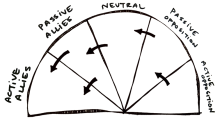
“Remember that this isn’t the only conversation/interaction you’re going to have,” writes Christena Cleveland.
The New York Times had Clinton supporters and Trump supporters ask each other these questions. Listen to their results here.
If all efforts at engaging have stalled, SURJ has a holiday hotline to help. “Get stuck? Simply text SOS to 82623.”
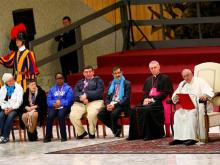
Pope Francis on [Nov. 11] made a surprise visit to meet several men who took the controversial step of leaving the priesthood and starting a family.
A Vatican statement said the pope left his residence in the afternoon and traveled to an apartment on the outskirts of Rome, where he met seven men who had left the priesthood in recent years. The pontiff also met their families.

Harper’s account of the Gospel in her new book is shalom-based. Drawing deeply from a theme that runs through the Bible but is especially strong in the Hebrew prophets, Harper tells a story of a God who acts in Jesus Christ to bring shalom, or holistic peace and justice, in every part of creation.
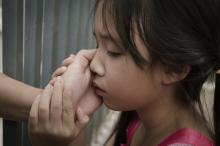
More than five million children in the U.S. have or have had a parent imprisoned. And the consequences can be devastating.
According to “A Shared Sentence,” a new report from the Annie E. Casey Foundation, “Having a parent incarcerated is a stressful, traumatic experience of the same magnitude as abuse, domestic violence, and divorce.”

With the April 23 release of LEMONADE, Beyoncé’s full-length visual album, I am convinced more than ever that “Formation” served as voice crying out on the internet, paving the way for even more conversations about the mistreatment, invisibility, and spiritual essence of black women.

Every time my husband and I talk about having a third child, I cry. I uggggly cry. He thought we were just talking about hopes and dreams for the future and third-row seating. Boy was he wrong.
The emotion that welled up inside of me (and still does) is hard to put into words, but I will try.
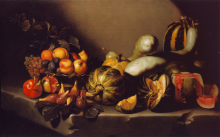
IN MY 20s, I came to the unsettling conclusion that God was calling me to have a baby. Familiar with Frederick Buechner’s declaration that vocation “is the place where your deep gladness and the world’s deep hunger meet,” I believed that my visceral yearning for children pointed toward my deep gladness. How my desire for children would meet the world’s great need, however, was far from clear, particularly in my small urban church where people routinely made great sacrifices in response to poverty and injustice.
In my progressive circles, childbearing can also be cast as ethically questionable, contributing to overpopulation and environmental degradation. In 2006, Katharine Jefferts Schori, then the presiding bishop of the Episcopal Church, summed up this view when she told an interviewer that “Episcopalians tend to be better-educated and tend to reproduce at lower rates than some other denominations. ... We encourage people to pay attention to the stewardship of the earth and not use more than their portion.” More crudely, proponents of a growing “childfree” movement dismissed parents as self-absorbed “breeders.”
I was also leery of claiming a call to motherhood because within some strains of Christianity, a woman’s vocation to motherhood is assumed, regardless of her circumstances or predilections. Many evangelical and Catholic Christians uphold the traditional nuclear family of husband, wife,
and children as the God-ordained bedrock of society and the church. Writing for the Family Research Council, Dr. Andreas J. Kostenberger of the Southeastern Baptist Theological Seminary writes, “The Bible defines ‘family’ in a narrow sense as the union of one man and one woman in matrimony which is normally blessed with one or several natural or adopted children” (emphasis in original). I feared that by claiming motherhood as my vocation, I might inadvertently support a limited vision that idolizes traditional families and sees childbearing as every woman’s primary calling.
Even Pope Francis has harsh words for those who choose not to procreate. As reported by the Catholic News Service in June 2014, Pope Francis stated that among “things Jesus doesn’t like” are married couples “who don’t want children, who want to be without fruitfulness.” Such couples are convinced, he argued, that by remaining childless they “can see the world, be on vacation...have a fancy home in the country...be carefree.” He warned that such couples are doomed to a bitter, lonely old age. The stereotype of childless adults as embittered hedonists is so widespread that writer Meghan Daum titled her recent anthology of essays by childless writers Selfish, Shallow, and Self-Absorbed.

Pope Francis on Nov. 11 urged Catholics to continue the tradition of a family meal, leaving smartphones aside, and switching off the TV to enjoy the “fundamental experience” of sharing food.
“The sharing of a meal — and therefore, other than of food, also of affections, of stories, of events — is a fundamental experience,” Francis said during his weekly audience in St. Peter’s Square.
Sitting around the table helps measure the health of relationships, the pontiff said: “If in a family there’s something that doesn’t work, or a hidden wound, at the table it’s understood immediately.”
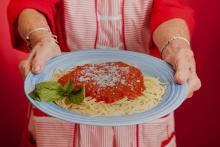
I still recall that moment when I first heard the words of the liturgy:
“The gifts of God for the people of God. Take them in remembrance that Christ died for you, and feed on him in your hearts by faith, with thanksgiving.”
I had never considered the Lord’s Supper as feeding on Christ. Growing up in a charismatic, non-denominational church and then embracing my faith as an adult at a Presbyterian church, I found this to be a foreign (and admittedly strange) concept that didn’t fully take root in me until after I began attending an Anglican church on Capitol Hill.
As I grappled with unemployment those first months in D.C., feeding on Christ in my heart by faith became more real to me: I didn’t have a seat at the proverbial table, but here was a table prepared for me, full of all the goodness and joy and love and peace and grace I could imagine, because it was Christ who was on offer.

On my way home from working at the Little League World Series in South Williamsport, Pa., I decided to do something that I’ve dreamed about for many years.
I would visit the lake.
There’s a lake just west of Youngstown, Ohio, that’s been special to me since I was about seven years old. It’s called Lake Milton. I don’t know the story behind how it got its name. But I can share my story of why it’s special.
Some of my friends know that my dad was an alcoholic. He didn’t drink every day, but when he did, he couldn’t stop. And he’d get loud and angry and abusive toward my mom. It was awful and frightening. I remember listening to the arguments and shaking uncontrollably. This went on for several years.
Fortunately, my dad eventually recognized he needed help and joined Alcoholics Anonymous. His sponsor was a funny, kind man named John. He became part of the family — we called him Uncle John. He and his wife, Fran, owned a cottage by Lake Milton. They encouraged us to use it for a week each summer.
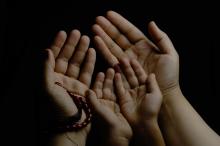
A new survey released from Pew Research Center, conducted in the lead-up to the pontiff’s visit, examined U.S. Catholics’ attitudes on family, marriage, and sexuality, as well as on issues close to the pope’s heart — concern for the poor, care for the environment, and forgiveness of sins. The results found Catholics “remarkably accepting of a wide variety of non-traditional families.”
This is not to say longstanding church teaching on marriage has changed — the church very much still upholds lifelong heterosexual monogamous marriage with children as the divine plan for coupleship, and nine-in-ten U.S. Catholics say this is the ideal arrangement. But large majorities now say other familial arrangements are acceptable, too.
According to the survey of U.S. Catholics, 85 percent say it is acceptable for a man and woman to live together as a couple outside of marriage, and 84 percent say it is acceptable for raise children in this arrangement. Two-thirds say it is acceptable for same-sex couples to raise children. And 70 percent say married couples who choose to not have children are choosing a lifestyle that is just as good as any other.

There’s a photo he carries for long journeys
like this one, for trips on loaded market lorries
where the passengers take their seat, perching
on top of cargo, or sitting on crude benches
inside the buses coming from Sudan with names
like “Best of Luck” or “Mr. Good Looking.”
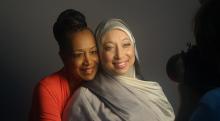
Alana Raybon was baptized as a child in the African Methodist Episcopal Church. She attended youth activities and vacation Bible school and even sang in the choir. But today, she wears a headscarf and worships Allah.
Her mother, Patricia, describes Alana’s conversion to Islam as “heartbreaking,” and yet, they’ve found a way to love each other despite the faith divide. They share their struggles in Undivided: A Muslim Daughter, Her Christian Mother, Their Path to Peace, a book that begs a vital question: how would you respond if your Christian child converted to Islam?
Religion News Service talked to them about their experience. Some answers have been edited for length and clarity.
Q: Alana, tell us the story behind your conversion.
Alana: I developed a love and reverence for God in church, but I couldn’t connect with the idea of the Trinity. I didn’t let my mother know about these feelings, and patiently waited to feel a connection to this concept. In my 20s, I began searching for spiritual enrichment and came upon the concept of Islamic monotheism — the idea of God being one, solely, without any associate. I became inspired to learn more about Islam and converted to the faith as a junior in college and called my mother to share the news.
Q: How did you react, Patricia?
Patricia: I was devastated. A daughter can call from college with all sorts of news — forgetting her mother is still dealing with her own life. In my case, my husband and I had hit a low point in our marriage, my widowed mother had come to live with us, my other daughter was closing a business, and my husband had a cardiovascular emergency. In all of that, Alana called from college to say, “Mom, I’m a Muslim.” Emotionally, I had run out of steam. So I thanked her for calling, asked how her classes were going and if her car was running OK. Then after a few minutes of such talk, we hung up. Looking back, it was my oddest reaction ever to a phone call.
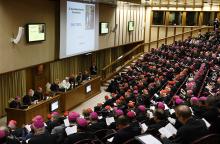
Pope Francis used his weekly audience Dec. 10 to challenge media reports of “clashes between factions” at the recent bishops’ synod on family issues.
“Some of you have asked me if the synod fathers fought,” Francis said. “I don’t know if they ‘fought,’ but they spoke forcefully. This is freedom. This is just the kind of freedom that there is in the church.”
In a bid to set the record straight, the pope acknowledged the extensive media coverage of the global gathering in October and likened it to “sports or political coverage.”
“They often spoke of two teams, pro and con, conservatives and liberals,” the pope told thousands of pilgrims in St. Peter’s Square.
“There was no clash between factions … but a dialogue between the bishops, which came after a long process of preparation and now continues, for the good of the family, the church, and society. It’s a process.”

Philadelphia Archbishop Charles Chaput says hot-button socio-sexual issues won’t be the central focus when the World Meeting of Families welcomes Pope Francis to the City of Brotherly Love next year.
Chaput told a Vatican conference on marriage and the family Nov. 19 that next year’s event comes “at a critical moment in global culture” and willaddress a broader scope of concerns.
“It will deal with a wide range of family issues where our religious faith is both needed and tested,” Chaput said.
“These are matters that affect all families, not only in the United States but on a world scale. So we want to focus next year not just on the neuralgic sexual issues that seem to dominate the American media.”
Reflecting the change in emphasis under Pope Francis that was evident at the recent Vatican Synod on the Family, the four-day event in Philadelphia will look at poverty and the family, marital intimacy, raising children, and the impact of divorce, as well as issues affecting the elderly and the disabled.
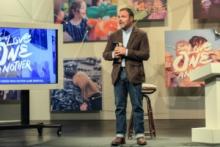
Mark Driscoll is back. Kind of.
The controversial founder of Mars Hill Church who stepped down last week offered a brief address at the Gateway Conference on Oct. 20. Initially, he and conference organizers agreed that he would not give a formal address at the conference.
But Robert Morris, pastor of Gateway Church in Dallas, said Driscoll requested to come to the conference as an attendee. “That was big of him to just come and be ministered to,” Morris said.
“We could crucify him, but since someone’s already been crucified for him…” he trailed off. “It’s very sad that in the church, we’re the only army that shoots at our wounded. And I’d like you to stop it.”
Driscoll’s resignation came in the wake of accusations of plagiarism, bullying and an oversized ego that alienated some of his most devoted followers.
Conference attendees gave Driscoll a standing ovation as Morris handed him the microphone.
“What do you want me to do?” Driscoll asked Morris, teasing him about the dangers of giving “a microphone to a preacher who’s been gone for a while.”
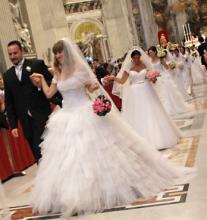
Pope Francis and his bishops got a wake-up call Oct. 7 from a Wisconsin couple who said the Catholic Church was failing to deal with the collapse of the traditional family.
Jeff and Alice Heinzen of La Crosse told the pope and 180 bishops attending a synod devoted to family issues that they were alarmed by the number of young people born out of wedlock or living with divorced parents.
The couple are one of 14 married couples invited to give their testimony.
“We have seen the number of marriages decline each year and the rate of cohabitation increase,” said the Heinzens, who have been married 34 years. “We know countless divorced adults who have joined other faith communities because they do not feel welcomed in the Catholic Church.”
What’s more, the couple added, the church’s pastoral programs were failing to address the forces impacting marriage and family life.
FROM EGG FREEZING to genome analysis, desirous parents with sufficient funds these days have many choices for starting a family. But what about children born to parents who can’t care for them—at least not at the present time? With 400,000 children in foster systems across the United States and a quarter of them awaiting adoption, it is a pressing question.
Some evangelicals increasingly are taking their cue from a particular biblical passage in the first chapter of James, verse 27: “Religion that is pure and undefiled before God ... is this: to care for orphans and widows in their distress ...”
From this verse has come the “127 movement,” dedicated to supporting prospective foster families within a church community. Project 1.27 in Colorado was the first group founded under this banner back in 2004. Its goal was to provide the state-mandated orientation and training, from a Christian perspective, to potential foster parents. If a family ended up fostering or later adopting a child, then the movement’s members would serve as a support network.
“We had 875 legally free kids waiting to be adopted in Colorado and twice that many churches,” recalled Project 1.27 director Shelly Radic. “We thought, ‘Wow, that’s just not right,’ so we began to build relationships with county social services and child services at the state level, and then connect with churches and private agencies to set up training.”
Since foster systems are run by individual states, so too are these faith-based support movements.
“We do recruiting, orientations, and training. We’re not a placement agency,” explained Radic. “We follow state guidelines, invite people to come who might be interested in foster care and adoption, tell them about the trauma and the hard things the children may have experienced, help families see what their process would look like, and talk about building a support team as a high priority.”